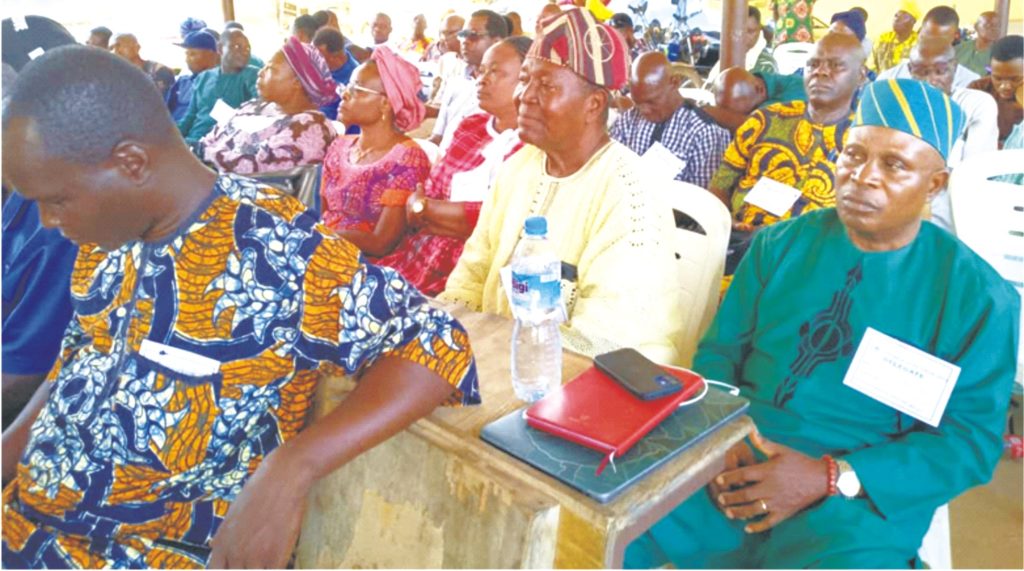At what age can a person acquire property?
Bamidele Kolawole
A property right is an incidence of the right to claim. A child cannot, as a matter of law, personally claim any right through judicial processes. The right holder can only claim that which he may hold. He cannot claim that which is required or acquired for him.

The right to acquire property is a right in person regulated by socio-legal factors. In law, a property right refers to a state of affairs in which one party, the right holder, has a claim on an act or forbearance of another party, the right owner, in respect of a thing.
Historically and socially speaking, children are morally considered both as a responsibility and property of their parents. Like any other concept of law, to give a straight forward answer the question, ‘at what age can a person acquire a property’, will lead to more complex questions.
Constitutionally speaking, every citizen of Nigeria has the right to acquire and own both movable and immovable property anywhere in Nigeria, subject to the 1999 Constitution of the Federal Republic of Nigeria (as amended) (the Constitution).
This is the gist of section 43 of the Constitution. Therefore, the right to acquire property is a fundamental human right, notwithstanding the age of the citizen, because the right is constitutional protected. However, the right to acquire property, like all other human rights, is not absolute.
To start with, property right is a right made up of bundle of other rights: the right to possess, the right to use, the right to manage, the right to the income of a thing, the right to the capital of the thing, the right to security, the rights or incidences of transmissibility and absence of term, the duty to prevent harm, liability to execution, and the incidence of residuality.
It therefore follows that a person can only acquire a property when (s)he is old enough to enjoy and exercise the rights to possess, use, manage, earn income from the property, employ the property as a capital of the thing, security the property, transmissibility and absence of term, perform the duty to prevent harm, liability to execution, and the incidence of residuality.
A property right is an incidence of the right to claim. A child cannot, as a matter of law, personally claim any right through judicial processes. The right holder can only claim that which he may hold. He cannot claim that which is required or acquire for him.
Now, under the Nigerian law, most of these cannot be enjoy by a minority or a person who is not up to 18 years. It then means, ordinarily a person cannot acquire a property unless (s)he is 18 years old. This is premised on the ground that the statutory common age for an individual to be considered an adult under the law in Nigeria is 18 years going by the provisions of the Child Rights Laws of various States in Nigeria and the Child Rights Act. Even at that, a person cannot, again, ordinarily, validly acquire landed property until he is 21 years of age according to section 7 of the Land Use Act.
Like every other general principle of law, there are exceptions to this general position of law regarding the age at which a persons can acquire a property. An adult can acquire property for the benefit of any person at any age. Hence, since a child become a person once he is born alive, (s)he can acquire properties that are consider necessities of life through their parents or guidance.
Also, a child, as provided by section 7 (b) of the Land Use Act, ‘under the age of twenty-one years upon whom a statutory right of occupancy devolves on the death of the holder shall have the same liabilities and obligations under and in respect of his right of occupancy as if he were of full age notwithstanding the fact that no guardian or trustee has been appointed for him.’ Thirdly, the status of a person and his position on may determine his or her capacity to acquire a property. A primary school pupil, despite the fact that (s)he is an underage or minor, can validly acquire property required for his or her training purposes.
This is the position of law as to the age a person can acquire property, movable or immovable, under the Nigerian law.

WHAT DOES THE WORD PROPERTY CONNOTE?
The term property has so many meanings, but it is generally regarded as an aggregate of rights belonging to a person which is guaranteed and protected. The word is commonly used to denote everything subject to ownership, corporeal or incorporeal, tangible or intangible, visible or invisible, real or personal.
Property may mean the right of a person to something tangible and physical such as a parcel of land.
The rights are given to the person or persons who have a right to own the property through purchase or bequest. These are basic fundamental rights in any society though absolute property right is rare in any society.
Section 43 of the 1999 Constitution of the Federal Republic of Nigeria as amended stipulates that subject to the provisions of this Constitution, every citizen of Nigeria shall have the right to acquire and own immovable property anywhere in Nigeria.
This is a Constitutional right of every citizen of Nigeria, it is fundamental, and that is why it appears in chapter four of the 1999 Constitution. Therefore, it is a constitutional right to own a property or own properties as the case may be but there are legislations meant to control the ownership of property.
The major one in Nigeria is the LAND USE ACT OF 1978 – It states in Section 7 – Restriction on Right of Person under age 21; it shall not be lawful for the Governor to grant a statutory right of occupancy or consent to the assignment or subletting of a statutory right of occupancy to a person under the age of 21 years provided that where a guardian or trustee for a person under the age of 21 years has been duly appointed for such purpose, the Governor may grant or consent to the assignment or subletting of a statutory right of occupancy to such guardian or trustee on behalf of such person under age.
By the Land Use Act, no person less than 21 years old can own land in Nigeria. It is illegal for any Governor to grant a statutory right of occupancy or give consent to any transfer of title of the land to any person that is less than 21 years old except for 2 reasons.
The 2 exceptions are; by inheritance, any person less than 21 years old can own land in Nigeria. And a person, less than 21 years old can also own land through a duly appointed guardian or trustee.
The above principle applies to lands under or granted by the Governor of a state (statutory ownership) and does not affect lands under customary ownership. Hence, the lands in Nigeria that have no minimum age limit for ownership are the lands under the Customary Right of Occupancy, like lands in rural areas.

The law is very clear in the Constitution of the Federal Republic of Nigeria, particularly in Section 43 where it states explicitly that every citizen of Nigeria has the right to own and acquire property in Nigeria.
However, notwithstanding the above, there are certain limitations to this rule. For instance, when it comes to landed property, Section 7 of the Land Use Act states that “a person under the age of 21 years upon whom a statutory right of occupancy devolves on the death of the holder shall have the same liabilities and obligations under and in respect of his right of occupancy as if he were of full age even though no guardian or trustee has been appointed for him.”
Thus, by the above, persons under the age of 21 are restricted from owning and acquiring property within the country, unless such property is purchased on his/her behalf by the guardian or through his trustee, and ownership of the property shall pass when he is of age, that is at the age of 21 years old.

In Nigeria, there are various sources of our legal system or jurisprudence. We have Received English Law which comprises of Common Law, Equity and Statutes of General Application that is Statutes that were in force in England as at 1st January, 1900.
We also have our own home grown laws which are referred to as native or customary laws. These native or customary laws must however not be repugnant to natural justice, equity and good conscience or against public policies.
We also have local statutes such as Acts of the National Assembly, Laws of various States’ House of Assembly, Military Decrees and Edicts etc. It is also important to mention the Constitution which is *the grund norm , the foundation of our legal system.
All these laws regulate our lives in modern day Nigeria. Ownership of land in Nigeria is governed by both Received English Law and Customary Law. Generally the age permitted by law for anyone to hold ownership title in respect of land is 21 years being the age of majority.
Consequently, the Governor of a State cannot grant a Statutory Right of Occupancy in respect of any land within the State to any person less than 21 years of age.
But under customary law, our custom allows a minor, that is somebody that is less than 21 years of age to hold title to land through inheritance.
Secondly, a minor can hold title to land through a proxy such as his guardian ad litem, his next friend or a Trustee who will hold the land in trust for him as a beneficiary or cestui que trust.
In conclusion, we can say that 21 years is the age allowed by Received English Law and Land Use Act for anyone to validly hold title to land. But there are instances where minors too may hold title to land in accordance with native law and custom or in accordance with principles of equity.

By Property, I presume you mean immovable Property. As to the age an individual can acquire property, I do not know of any Law that stipulates the age at which an individual can acquire property, however, I know that it is a fundamental right enshrined in the constitution of Nigeria, that anyone can own immovable property, under Sect. 43 of 1999 CFRN (As Amended).
And the definition of the word individual under the law is a human being with a specific identity.
It is my opinion that the law will not put an age Bar to limit owning a property except for checkmate FRAUD.
A child can become the owner of a property via inheritance in the deceased parent’s Estate.

There is a restriction on the age of persons that can own land in Nigeria. Though the common adult age in most laws in Nigeria is 18 years, that is not the same with issues of land. The minimum age for any person to own land in Nigeria is 21 years, although there are two exceptions to this.
By inheritance, any person less than 21 years old can own land in Nigeria. And a person, less than 21 years old can also own land through a duly appointed guardian or trustee.
In summary, it is illegal for any Governor to grant a statutory right of occupancy or give consent to any transfer of title of the land to any person that is less than 21 years old except for the above two reasons.
Note that this applies to lands granted by the Governor of a state (statutory ownership) and does not affect lands under customary ownership.
I cited my authorities from sections 1, 7, 51, and 52 of the Land Use Act.

Before we discuss on the age one can attain before one can own a property, it is important to have the full grasp of the meaning of property.
Property can be defined as something owned; any tangible or intangible possession that’s owned by someone. Property has to do with ownership and property can be movable and immovable property, tangible and intangible property, private and public property, personal and real property, corporeal and incorporeal property.
Flowing from the above, property can be a general parlance for all the aforementioned types of property and it depends on its context before one can fully decipher the age at which a property can be acquired. But for the purpose of clarity, we can say property in this context denotes ”landed property” or simply, “land” which is legally defined in the Black’s Law Dictionary as “…any ground, soil, or earth whatsoever; as meadows, pastures, woods, moors, waters, marshes, and heath … everything attached to it, whether attached by the course of nature, as trees, herbage, and water, or by the hand of man, as buildings and fences”.
Having said the above, one can now go further by stating emphatically the age at which one can acquire a property in Nigeria.
Though the common adult age in most laws in Nigeria is 18 years, that is not same with issues of land. 1999 Constitution of the Federal Republic of Nigeria (as amended), in Section 43 confers the right of ownership of land to “every citizen” of Nigeria. It reads thus:
“Subject to the provisions of this constitution, every citizen of Nigeria shall have the right to acquire and own immoveable property anywhere in Nigeria.”
What this means is that everyone who is a citizen of Nigeria has the right to own property i.e. every Nigerian can own property. No exceptions were created in the constitution which is the _grundnorm_ through which other legislations derived their powers. As long as you were born in Nigeria or you have acquired Nigerian citizenship by virtue of the conditions stipulated in Section 25 of the Constitution, you are qualified to own land in Nigeria. But the Land Use Act which is the particular legislation on ownership of land stipulates the age one must attain before he/she can acquire land in Nigeria which is different from age 18 that’s considered as majority age in most of our legislations. The minimum age for any person to own a land in Nigeria is 21 years.
The Land Use Act, in Section 7, particularly Sub section (a) disqualifies any person under the age of “twenty one” from owning property except through a guardian or trustee.

The common age for an individual to be considered an adult in most laws in Nigeria is 18 years, which is not the same with issues of land. The minimum age for any person to own land in Nigeria is 21 years, although there are two exceptions to this. By inheritance, any person less than 21 years old can own land in Nigeria.
Ordinarily, no person less than 21 years old can own land in Nigeria. It is unconstitutional for any Governor to award a statutory right of occupancy or give consent to any transfer of title of the land to any individual who is less than 21 years old except for 2 purposes.
A person less than 21 years old, can lawfully purchase, own, and even sell his land in Nigeria, where;
1. A legally appointed guardian or trustee stands for a person less than 21 years old. So, the land is purchased or sold on behalf of a person less than 21 years old.
2. By death, any person less than 21 years old inherits land in Nigeria.
Note that this applies to lands under or granted by the Governor of a state (statutory ownership) and does not affect lands under customary ownership.










